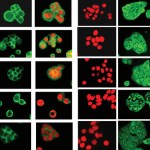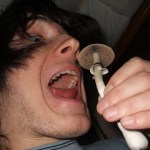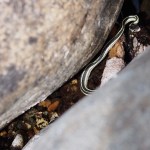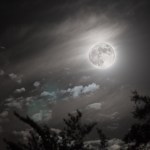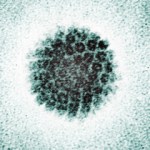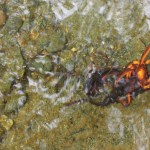
The fifth assessment report of the Intergovernmental Panel on Climate Change was released last week, saying that global warming is occurring without a doubt, and human activity is extremely likely to be the cause. Greg Laden shares a number of graphics from the report, summarizing "It is getting hotter. It is getting wetter, or dryer, depending on where you are. And the big ice hat our planet wears is falling off." Peter Gleick collates a number of excerpts related to water on Significant Figures, which say that there are likely more regions getting more rain than less; the frequency of…
On Pharyngula, PZ Myers says that cancer, unlike an infectious bacterium or virus, is not the product of millions of years of evolution. Instead, PZ writes, “Cancer misuses and perverts existing processes in your cells to send them out of control.” But what causes cancer? Well, it happens about 20,000 times a day in your body. Luckily, it is almost always repaired. It is the mutation of DNA during cell division. Just one base out of place, and suddenly the gene that made a protein to tightly regulate cell division is making a protein that encourages the cell to divide continually. Depending…
The U.S. "war on drugs," besides failing to meet its goals, has demonstrated a stubborn ignorance of the effects that different drugs have in the human body. Granted, some drugs cause degeneration and are properly outlawed. Opiates such as heroin and stimulants such as cocaine and methamphetamine take a harsh physical toll and leave users addicted to the chemical. But classified along with these truly dangerous drugs are some of nature's most mysterious medicines. New research shows how marijuana, psychedelics, MDMA and even ketamine have positive physiological and psychological effects that…
After thirteen years and three films, it's still hard to know what to think about Richard B. Riddick. No one calls him Dick. His luminescent mother-of-pearl cat's eyes allow him to see in the dark, when they're not protected by an iconic pair of black welding goggles. He is very talented at killing people and animals, especially with melee weapons or hand-to-hand. He's not based on any literary or comic-book character. Judging by his conversational abilities, he may be brain damaged or developmentally disabled. He is extremely strong. He is played by Vin Diesel.
In Pitch Black (2000),…
I found this beautiful snake basking in barely flowing water at an elevation of about 5800' in the Sierra Nevada mountains of California. At first I thought it was a striped racer, but racers have two light stripes on their sides, while this one has a light stripe down the middle of its back and a light underbelly. It appears to be a juvenile garter snake, or at this altitude, it could be full-grown, morphologically adapted to a less plentiful food web. It's rather small, about 24" long. Click any image below for full size.
Light belly, dark back with a single stripe down the middle.
It…
For writer and director Neill Blomkamp, Elysium is round two of sci-fi feature as social allegory, following in the footsteps of 2009's District 9. Whereas District 9 paralleled the history of apartheid in South Africa, Elysium deals with issues of illegal immigration and social class, centered on everyone's favorite pre-apocalyptic wasteland, Los Angeles.
It's a pure joy to see L.A. extrapolated to a vibrant, populous, spray-painted pile of rubble in the year 2154, where even gringos like Matt Damon hablan español. This proletariat L.A., where ex-con Damon earns minimum wage building robot…
Posted to the homepage on August 11, 2013.
The Moon—like the sun, stars and Earth—is easy for a human being to take for granted. But the Earth's moon is truly exceptional, and should be appreciated for shaping the exceptional world we live on. Earth is the only planet with a single moon, and relative to the Earth, Luna is the largest moon in the solar system. The Moon thus exerts a strong, solitary influence on the planet it was torn from. Evidence suggests that the Moon was blown into orbit by a massive asteroid impact about 4.5 billion years ago, shortly before the emergence of life on…
Windows takes a lot of crap from fanboys, and Apple products do the same, but while our prejudices can be well-founded it's always worth taking an honest look at the opposition. With its Windows Phone mobile OS, Microsoft has built a very fun and functional platform that in some ways exceeds the user experience of Android and iOS.
Microsoft's presence on mobile platforms somewhat changes its historical relationship with hardware. In the days when you were a PC person or a Mac person, one advantage of the personal computer was an open hardware standard, allowing not only for custom computer…
In his role pinch-hitting as The Daily Show anchor while Jon Stewart directs a feature film called Rosewater, John Oliver has demonstrated a candid, hilarious fury that is unmatched in its impact by Stewart's usual well-meant silliness. People have called Stephen Colbert the heir to 1950's primetime BS-caller Edward R. Murrow, and Colbert is certainly unmatched in his own way, but after seeing Oliver in the limelight, it's hard to imagine a more urgent rebuttal to the media and political hypocrisy of our day.
Last night Oliver didn't have to work hard to demonstrate the ridiculousness of…
Life has been growing on Earth for about 4 billion years, and during that time there have been a handful of mass extinctions that have wiped out a large percentage of complex lifeforms. Asteroid impact, volcanic eruption, climate change, anoxia, and poison have dispatched untold numbers of once-successful species to total oblivion or a few lucky fossils. Species also die off regularly for much less spectacular reasons, and altogether about 98% of documented species no longer exist.
Cry me a river, you say, without all that death there would have been no gap for vertebrates, for mammals, for…
Water may be the most abundant molecule on the surface of the Earth, but more than 99% of it is frozen, underground, or too salty to drink. Only .007% of the planet's water runs in rivers and lakes, yet this precious amount sustains massive populations worldwide. Agricultural societies have long gone to war over water, and as the Earth's population balloons toward 10 billion, global warming destabilizes weather patterns, and pollution sullies what little is left to count on, the conflicts will only get worse. On Significant Figures, Peter Gleick traces Syria's civil war in part to "drought…
The will of the voters in Portland, Oregon has endured for more than fifty years, for the fourth time rejecting fluoridation of the city's tap water in a ballot referendum. On Respectful Insolence, Orac writes "public water supplies are a precious commodity. To justify putting something in them requires good evidence of safety and efficacy." And continues "since 1945 the fluoridation of drinking water has reduced tooth decay by 40-70% in children and tooth loss in adults by 40-60%." Orac respects Portlanders' right to more cavities, but says "classic antiscience arguments" won the day at…
The threshold of 400 carbon dioxide molecules per million molecules of Earth's atmosphere is an arbitrary but still significant milestone, reflecting a near 50% increase in the concentration of the greenhouse gas since humanity first started burning fossil fuels for industry. Sure, the Earth has experienced hotter chemistry before, but Peter Gleick says it all the in the title of his post: The Last Time Atmospheric CO2 was at 400 parts per million Humans Didn’t Exist. The Arctic was also free of ice, and CO2 levels were changing 1000 times slower than they are today. Not that we can't survive…
Last week the European Union voted to ban neonicotinoid pesticides in an effort to fight colony collapse disorder among honeybees. Although research has clearly fingered these pesticides in bee behavioral problems, the ban is still rather speculative, as multiple environmental factors may be at play in CCD. Greg Laden writes "navigation over long distances, communicating with other bees about newly found hard to get and far away sources of food, mechanisms of controlling reproduction within the colony, thermoregulation of the hive, building and maintaining architecture," and other bee…
Walking on two legs, time and space seem universal, but take a good look at the universe, and things start to get mushy. Chad Orzel defines time with a circular-sounding title, writing “there isn’t a giant master clock at the center of the universe that everybody sets their watches by.” Although time can only be measured in ticks, two clocks are seldom in agreement. Chad says “Scientists in Colorado have clocks so good they can measure the change in time from moving at walking speed, or from moving one foot higher in elevation.” On Starts With a Bang, Ethan Siegel revisits the speed of light…
Dr. Dolittle spent a few days at the Experimental Biology meeting of the American Physiological Society, learning incredible facts about animal adaptability. In the Sunday session, researchers showed that metabolic byproducts called ketones can protect against seizures caused by hyperbaric oxygen therapy, while seal pups, who fast for up to three months once weaned, increase their insulin resistance and become effectively diabetic. Monday taught us that insects lack lungs, instead exchanging gas through tiny valves called spiracles along their abdomen, while a Burmese python, after eating a…
On ERV, Abbie Smith reports on the phenomenal success of the HPV vaccine in Australia. The vaccine, designed to protect against several types of sexually-transmitted papillomavirus, was first administered to Aussie girls in 2007. Since then, total prevalence of the virus among young women has dropped from 11.5% to less than 1%—and to 0% among girls who actually got the vaccine. These girls are also protecting their partners and reducing overall circulation of HPV; infections among young men, who were not even vaccinated, dropped from 12.1 to 2.2 percent. Abbie calls this a "blatant,…
A new strain of bird flu is circulating in China, and authorities are keeping a close eye on a potentially disastrous scenario. On Aetiology, Tara C. Smith writes that by now, "the microbe may have already become established in the population, adapting to humans stealthily before we were even aware of it." Greg Laden writes, unlike H1N1 in 2009, the new H7N9 doesn't sicken birds, making it more difficult to identify reservoirs of the virus. And according to the latest reports, it doesn't make all people sick either. Documented infections are widespread in a populous region, and of more…
I have been remiss in not posting articles from the homepage here on Page 3.14...so to catch up, here's four at once.
No Beauty Without Water
On World Water Day, think of the water cycle that defines this planet. On The Pump Handle, Liz Borkowski writes "rivers often flow through multiple countries, and actions by one country or community can affect their neighbors’ ability to meet their water needs. Consuming too much water, or polluting a shared body of water, can make it hard for others to have enough for drinking, hygiene, agriculture, ecosystem health, and other needs." Rivers and…
With springtime comes the urge to head to the river. These California newts are obeying urges of their own. Also known as Taricha torosa, this newt is an amphibian and a member of the Salamander family.
Just as beautiful as the newts is the surface of the water. I wish I could breathe under water!
I counted more than a hundred of these along a small creek that flows into the Yuba river. According to Wikipedia, these animals are land-dwelling for the hotter parts of the year, but prefer "slow-moving water" while breeding. Between December and May, they can be found in little orange…

